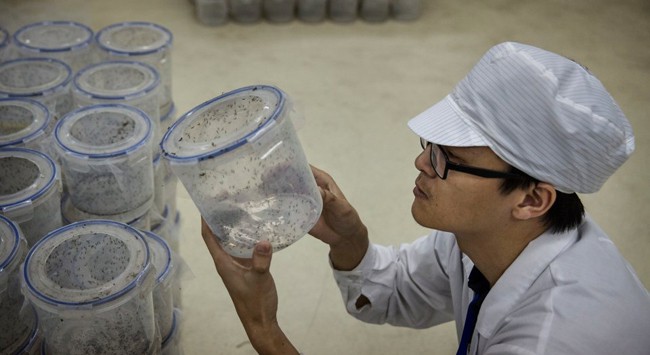
‘കൊതുകു ഫാക്ടറി’യുമായി ചൈന. ഓരോ ആഴ്ചയും ഈ കൊതുകു ഫാക്ടറിയില്നിന്ന് 30 ലക്ഷം കൊതുകുകളെയാണ് ശാസ്ത്രജ്ഞര് പുറത്തുവിടുന്നത്. ഡെങ്കി, മഞ്ഞപ്പനി, സിക്ക തുടങ്ങിയ കൊതുക് പരത്തുന്ന രോഗങ്ങള് തടയാനാണിത്. പ്രത്യേക ബാക്ടീരിയല് അണുബാധയേറ്റ കൊതുകുകള് മറ്റു കൊതുകുകളെ നശിപ്പിക്കാന് ശേഷിയുള്ളവയാണ്. പ്രധാനമായും ഗ്വാന്ഷോയ്ക്കു സമീപമുള്ള ദ്വീപിലാണ് പരീക്ഷണാടിസ്ഥാനത്തില് കൊതുകുകളെ തുറന്നുവിടുന്നത്.
കൊതുകുകളുടെ മുട്ടയുടെയൊപ്പം ബാക്ടീരിയയെയും ലബോറട്ടറിയില് വളര്ത്തുകയാണ് ശാസ്ത്രജ്ഞര് ചെയ്യുക. വളര്ച്ചയെത്തിയ ആണ്കൊതുകുകളെയാണ് പുറത്തേക്കു വിടുന്നത്. ബാക്ടീരിയല് അണുബാധയുള്ള ഈ കൊതുകുകളുമായി പ്രകൃതിയിലെ കൊതുകുകള് സമ്പര്ക്കത്തിലാകും. ഇതുവഴി ബാക്ടീരിയ പകരുകയും ആ കൊതുകുകള് നശിക്കുകയും ചെയ്യും. മാത്രമല്ല അവയ്ക്ക് ഡെങ്കി, മഞ്ഞപ്പനി, സിക്ക രോഗകാരികളായ വൈറസുകളെ മനുഷ്യരിലേക്ക് വ്യാപിപ്പിക്കാന് കഴിയാതെ വരുകയും ചെയ്യുന്നു.
5000 പെണ്കൊതുകുകളെയും 1,600 ആണ് കൊതുകുകളെയും പ്രത്യേക കൂട്ടിലടച്ചാണ് മുട്ടകള് ശേഖരിക്കുന്നത്. ഈ മുട്ടകളുടെയൊപ്പം വോള്ബാക്കിയ ബാക്ടീരിയകളെയും വളര്ത്തുന്നു. ഈ ലബോറട്ടറിയില് ഒരോ ആഴ്ചയും 50 ലക്ഷം കൊതുകുകളെ ഉത്പാദിപ്പിക്കാനുള്ള ശേഷിയുണ്ട്. 3,500 ചതുരശ്രമീറ്റര് വലുപ്പമുള്ള ‘കൊതുകുഫാക്ടറി’ 2012ലാണ് ആരംഭിച്ചത്. ഈ ദ്വീപിലെ കൊതുകുകളുടെ എണ്ണത്തില് 90 ശതമാനത്തോളം കുറവു വന്നിട്ടുണ്ടെന്ന് ശാസ്ത്രജ്ഞനും കൊതുകു ഫാക്ടറിയുടെ ശില്പിയുമായ ഷിയോംഗ് ഷി പറഞ്ഞു.




Post Your Comments